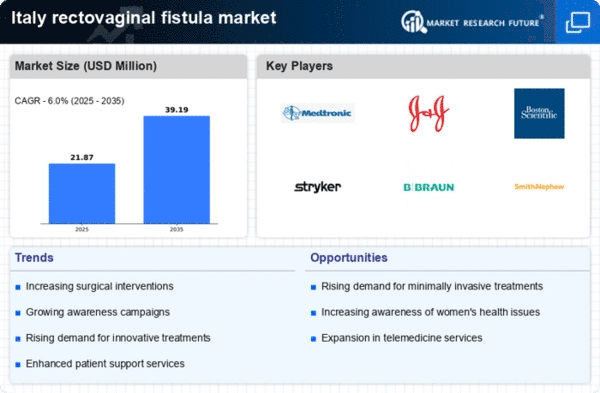Government Initiatives and Funding
Government initiatives aimed at improving women's health in Italy play a significant role in shaping the rectovaginal fistula market. Increased funding for healthcare programs focused on maternal health and surgical interventions is expected to enhance access to treatment. The Italian government has allocated substantial resources to address women's health issues, which may include the prevention and management of rectovaginal fistulas. This financial support could lead to the development of specialized clinics and training programs for healthcare professionals. As a result, the rectovaginal fistula market may experience growth due to improved patient access to care and enhanced treatment options, ultimately benefiting women affected by this condition.
Patient Advocacy and Support Groups
The emergence of patient advocacy and support groups in Italy is influencing the rectovaginal fistula market. These organizations play a crucial role in raising awareness about the condition and advocating for better treatment options. By providing resources and support to affected individuals, these groups help to empower patients to seek medical attention. Increased visibility of rectovaginal fistulas through advocacy efforts may lead to a higher demand for surgical interventions and related healthcare services. Furthermore, as these groups collaborate with healthcare professionals, they may facilitate research and development initiatives aimed at improving treatment outcomes. This dynamic could significantly impact the growth trajectory of the rectovaginal fistula market.
Technological Innovations in Treatment
Technological advancements in medical devices and surgical techniques are transforming the rectovaginal fistula market. Innovations such as minimally invasive surgical procedures and advanced imaging technologies are enhancing the effectiveness of treatments. For instance, the introduction of laparoscopic techniques has shown promising results in reducing recovery times and improving surgical outcomes. Additionally, the development of biocompatible materials for surgical repair is likely to increase the success rates of rectovaginal fistula repairs. As these technologies become more widely adopted in Italy, they may drive market growth by offering patients safer and more effective treatment options, thereby addressing the needs of a growing patient population.
Increasing Incidence of Rectovaginal Fistulas
The rising incidence of rectovaginal fistulas in Italy is a critical driver for the rectovaginal fistula market. Factors such as childbirth complications, pelvic surgeries, and inflammatory bowel diseases contribute to this increase. Recent data indicates that approximately 1 in 1,000 women may experience this condition post-delivery, highlighting the need for effective treatment options. As awareness grows regarding the impact of these fistulas on women's health, healthcare providers are more likely to seek innovative solutions. This trend suggests a potential growth in the market, as more patients seek surgical interventions and conservative management options. The healthcare system's response to this rising incidence is likely to shape the future landscape of the rectovaginal fistula market, driving demand for specialized products and services.
Rising Demand for Specialized Healthcare Services
The increasing demand for specialized healthcare services in Italy is a notable driver for the rectovaginal fistula market. Patients are increasingly seeking care from specialists who can provide tailored treatment options for complex conditions like rectovaginal fistulas. This trend is reflected in the growing number of specialized clinics and healthcare providers focusing on women's health issues. As patients become more informed about their treatment options, they are likely to seek out facilities that offer comprehensive care, including preoperative counseling and postoperative support. This shift towards specialized care may lead to an expansion of the rectovaginal fistula market, as healthcare providers adapt to meet the evolving needs of their patients.

















Leave a Comment